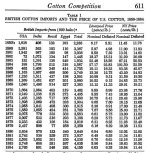Worse, the UK might not want CSA cotton and poor whites won't want black competition (this was already happening in GOTS). This isn't going to end well for anyone.
By the 1870s, the South was back to being the top Cotton exporter to the UK:

Given British trade with Brazil, I don't see any reason why this would change. Historically
this opened up a lot of wealth turnover in the South:
It is apparent that there was considerably more turnover among the ranks of top southern wealth holders than among northern wealth holders. While more than half of those in the top 5% of northern wealth holders had been in the same group in 1860, just one-third of top southern wealth holders in 1870 had enjoyed a similar status in 1860. Roughly the same proportion of the top 5% in each region was drawn from the next stratum of wealth holders in 1860 (90th to 95th percentile). On the other hand, our data suggest that the turmoil of the Civil War decade created much greater opportunities for those with moderate wealth in 1860 – between the 55th and 90th percentiles – to move up to the top of the wealth distribution. Nearly 40% of the wealthiest southerners in 1870 had been in this group in 1860, compared to less than one quarter of the richest northerners.
Frankly, I think the CSA will be very lucky to hold together at all. They were never a united power, at least not as united as they claimed, and while the war will have given them a sense of nationhood the post-war world will challenge it. They'll resist the growth of centralised power, and the confederate government will have problems pushing back; they'll be short on money, which means funding an army will be difficult.
Turtledove presents the Rivington Crisis as a sort of analogue to Shays Rebellion, with Nathan Bedford Forrest offering to restore his commission to Lee and fight against anybody who attempted to sunder the Confederacy. Given NBF had been Lee's opponent in their bitterly contested election and thus the main opposition leader, it's suggested this soothes over most things.
It's also worth noting the "State's Right" stuff is Lost Cause mythology; the Confederate Constitution actually banned secession, if you can believe it lol.
The CSA was actually the most centralized authority in North American history until the New Deal Era.
Modernizing a Slave Economy: The Economic Vision of the Confederate Nation by John Majewski, Chapter
ECONOMIC NATIONALISM AND THE GROWTH OF THE CONFEDERATE STATE:
States’ rights ideology, though, eventually lost to a more expansive vision of the Confederate central state. As Table 6 shows, the Confederate government chartered and subsidized four important lines to improve the movement of troops and supplies. Loans and appropriations for these lines amounted to almost $3.5 million, a significant sum given that a severe shortage of iron and other supplies necessarily limited southern railroad building. Jefferson Davis, who strongly backed these national projects, argued that military necessity rather than commercial ambition motivated national investment in these lines. The constitutional prohibition of funding internal improvements ‘‘for commercial purposes’’ was thus irrelevant. That Davis took this position during the Civil War followed naturally from his position on national railroads in the antebellum era. Like Wigfall, he believed that military necessity justified national railroad investment. As a U.S. senator, Davis told his colleagues in 1859 that a Pacific railroad ‘‘is to be absolutely necessary in time of war, and hence within the Constitutional power of the General Government.’’ Davis was more right than he realized. When the Republican-controlled Congress heavily subsidized the nation’s first transcontinental railroad in 1862, military considerations constituted a key justification. Even after the Civil War, the military considered the transcontinental railroad as an essential tool for subjugating the Sioux and other Native Americans resisting western settlement.
When the Confederate Congress endorsed Davis’s position on railroads, outraged supporters of states’ rights strongly objected. Their petition against national railroads—inserted into the official record of the Confederate Congress—argued that the railroads in question might well have military value, ‘‘but the same may be said of any other road within our limits, great or small.’’ The constitutional prohibition against national internal improvements, the petition recognized, was essentially worthless if the ‘‘military value’’ argument carried the day. Essentially giving the Confederate government a means of avoiding almost any constitutional restrictions, the ‘‘military value’’ doctrine threatened to become the Confederacy’s version of the ‘‘general welfare’’ clause that had done so much to justify the growth of government in the old Union. The elastic nature of ‘‘military value,’’ however, hardly bothered the vast majority of representatives in the Confederate Congress. The bills for the railroad lines passed overwhelmingly in 1862 and 1863. As political scientist Richard Franklin Bensel has argued, the constitutional limitations on the Confederate central government ‘‘turned out to be little more than cosmetic adornments.’’



